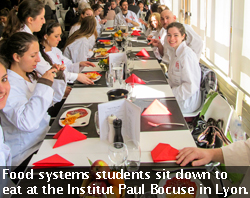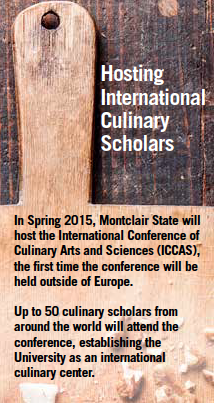Food for Thought
 The birthplace of nouvelle cuisine and culinary classics like coq au vin, Lyon, France, serves as the backdrop for Montclair State students studying gastronomy and food management, letting them explore first hand the relationship between French culture and food.
The birthplace of nouvelle cuisine and culinary classics like coq au vin, Lyon, France, serves as the backdrop for Montclair State students studying gastronomy and food management, letting them explore first hand the relationship between French culture and food.
The spring break trip to Lyon, as well as Paris, caps off a key Food Systems course and is one of the international initiatives developed by the University’s Food Systems Program to help students understand the roles that culture, politics and business play in shaping different global food systems.
While in Lyon, they study French cuisine at the Institut Paul Bocuse – widely considered to be the world’s premier culinary academy. Their first glimpse of the institute’s 19th-century Chateau du Vivier lets them know they are in for a rare and unforgettable experience.
“It’s incredible. We get to learn at a top culinary school which happens to be located in a castle in France,” says Chana Hurwitz, a nutrition major with a concentration in dietetics. “The school is beautiful, inspirational and exciting. We are surrounded by experts in their fields, with creativity everywhere.”
For the second year, Health and Nutrition Sciences professors Charles Feldman and Douglas Murray led the gastronomic study tour of Paris and Lyon, where students also select ingredients from local markets for class cooking projects and interact with the institute’s culinary faculty.
We are what we eat
“When you talk about food, you’re talking about different people and cultures,” says Feldman. “Because our students go on to work with food in many settings, they need to understand cultural diversity and tradition. They need to know what people eat, and why they eat it.”
Besides touring France, Montclair State Food Systems students are taking part in a variety of globally focused programs that prepare them to produce foods that meet the needs of an increasingly diverse population. Recent international initiatives, including the culinary tour and a collaboration and exchange with the University of Bournemouth in England, have helped make students aware of the differences between global food systems.
“The Bocuse Institute, for example, trains chefs in classic French cuisine. Our students learn about nutrition. This program shows them that it’s possible to blend the culinary traditions of the past with a nutrition-focused future,” notes Feldman.
 Vive la différence!
Vive la différence!
In Paris last spring, the Food Systems students toured Les Halles, the site of the famed market known as “the belly of Paris” that served the city for more than 800 years until its demolition in 1971. Then it was off to Lyon and the Bocuse Institute by train.
The students received credit for the dietetics concentration’s Quantity Food Applications course. “They completed their meal design project at the Institute, purchasing the ingredients and producing their meals there,” says Murray.
Despite the language barrier, the students eagerly met the challenge of shopping in French markets for the ingredients they needed to prepare dishes like sweet and sour tofu with rice and mixed vegetables and navarin of beef with couscous.
“Shopping in the markets is an amazing learning experience. All the produce is fresh and seasonal and even the lower-end items are gourmet,” says Hurwitz.
 Broadening their experiences teaches students a lot, says Feldman. “They try new foods like snails (escargots) and learn they can’t look down on food. They need to know what people eat, because they won’t be able to prescribe an effective diet without understanding people’s traditions and food preferences.”
Broadening their experiences teaches students a lot, says Feldman. “They try new foods like snails (escargots) and learn they can’t look down on food. They need to know what people eat, because they won’t be able to prescribe an effective diet without understanding people’s traditions and food preferences.”
The so-called “French paradox” offered another key lesson. “Despite a diet rich in cream, cheese and wine, the French look great,” says Feldman. “The lesson here is to enjoy things in moderation.”
While class of 2015 nutrition major Kathlene Bator particularly enjoyed tasting the food and working in the institute’s kitchen with professional chefs, she notes that the French seem less concerned with nutrition than Americans. Hurwitz agrees, observing that “the French respect their food, and it is prepared as an art.”
The professors have already scheduled a return trip for the 2014 spring break. Plans are also in the works for a Bocuse Institute chef to visit campus in the spring to conduct workshops for Quantity Food Production course students. “This will expose even more students to a different culinary tradition,” says Murray.
Foreign exchange
 One of Montclair State’s other initiatives – the educational and scholarly partnership with Bournemouth University – offers students an additional opportunity to compare and contrast how different cultural traditions and political systems determine how food is produced, processed, served and consumed. Professors Feldman and Murray visited the English university in August to finalize the curriculum for a dynamic new exchange program.
One of Montclair State’s other initiatives – the educational and scholarly partnership with Bournemouth University – offers students an additional opportunity to compare and contrast how different cultural traditions and political systems determine how food is produced, processed, served and consumed. Professors Feldman and Murray visited the English university in August to finalize the curriculum for a dynamic new exchange program.
“This is a comprehensive collaborative program,” explains Feldman. Beginning in Spring 2014, an initial group of Montclair State students will spend the semester in Bournemouth and Bournemouth University students will study at Montclair State.
The professors have worked to align Food Systems courses with those of the British university, so that credits will transfer for students from both schools. There will be more faculty exchanges like the campus visit by Bournemouth’s Professor Crispin Farbrother. The Bournemouth University hospitality program professor spoke to five undergraduate and graduate Food Systems classes about the differences between European and American food production. In turn, Montclair State faculty will guest lecture at Bournemouth.
The new program will also feature live-streamed classes. In February 2013, students from both universities attended an online food management class that focused on the differences between food production systems in British and American hospitals and prisons. “It was interesting to hear the insights of students from a different country based on their experiences and surroundings,” says Bator.
“Being culturally sensitive is an important part of the nutrition profession, and learning to collaborate with people from other countries is an invaluable experience, whether it is via technology or studying abroad,” says Hurwitz. “I’ve learned there are many different ways that people can live their lives and relate to food.”
